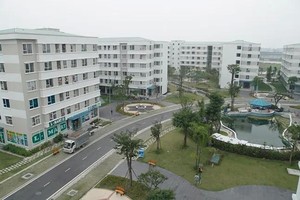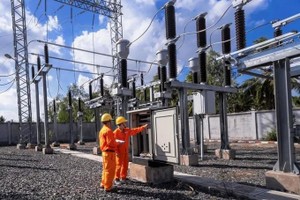
Over 18,500 households have made the switch
In early November 2025, Nguyen Thi Lan, a business owner in HCMC, finalized her transition from a flat-tax household to a declaration-based one. Operating in the retail sector with an annual revenue of over VND800 million (approx. $31,500), she had long been accustomed to paying her flat tax once a year. Over the past few months, hearing about the policy to abolish the flat tax, she had been waiting for the local government’s instructions.
After thoroughly researching the matter, and with support from tax authorities and a solution provider, she decided to take the plunge. “I submitted my conversion file at the tax office, made an inventory record of my stock, started using electronic invoices, and opened a separate bank account,” Lan shared. “I was worried, of course, but the officials really consulted and supported me. Many of my business partners who just switched also told me that I’d get used to it gradually.”
Deputy Head of the HCMC Tax Department Nguyen Van Thanh stated that during this 60-day peak period, the city’s tax sector is determined to successfully convert 100 percent of business households paying flat tax over to the declaration method.
Currently, HCMC has over 364,000 stable business households. Among them, nearly 346,000 are flat-tax ones, while 18,568 are already filing declarations. Breaking down the flat-tax group:
- 179,000 households have revenue of VND200 million/year or less ($7,600);
- Over 163,000 households earn between VND200 million – 3 billion/year ($7,600-113,700);
- 3,099 households earn over VND3 billion/year.
As of October 31, the total budget revenue from business households and individuals reached over VND9.2 trillion ($362 million), accounting for more than 2 percent of HCMC’s total tax revenue and marking a 53-percent increase compared to the same period last year.
By mid-October 2025, 98 percent of households nationwide paid electronically, over 18,500 switched from flat tax, and 133,000 adopted e-invoices. These figures demonstrate a positive shift in policy and the “rapid adaptability” of businesses facing this major change.
Nationwide, there are approximately 3.83 million business households.
- 1.7 million households (44.4 percent) with revenue under VND200 million will be tax-exempt.
- 883,000 households (23 percent) with revenue between VND200 million and VND3 billion are the main group impacted.
- 39,000 households (1 percent) with revenue over VND3 billion have already applied declaration methods, so they are less affected.
The General Department of Taxation emphasized that the goal of this project isn’t to increase the tax burden. Rather, it aims to create a transparent and fair business environment while helping households gradually access modern management methods.
Deputy Director of the General Department of Taxation Mai Son noted that compared to the flat tax mechanism, this is a fundamental change in both management and tax liability determination. The Ministry of Finance will issue accounting regimes tailored to each threshold. Specifically, small households will only need to record basic revenue and expenses, while larger households will apply bookkeeping similar to micro-enterprises, thereby enhancing their financial management capacity and professionalism.

Openness, transparency mean no violations
Chairwoman Nguyen Thi Cuc of the Vietnam Tax Consultants’ Association (VTCA) noted that despite a willingness to switch, businesses fear retrospective tax collection. She argued penalties should apply only to deliberate evasion.
Tax leaders reassured that households operating normally won’t face back taxes. However, to ensure fairness, undeclared activities such as hidden locations, e-commerce operations, or under-reported revenue will still remain liable for collection based on the specific situation.
Addressing fears of penalties and inspections, Mr. Mai Son affirmed that the more public, transparent, and compliant a household is, the less likely they are to face administrative violations. Crucially, he stated that compliant households will not be inspected; authorities will only check based on risk thresholds.
Regional Sales Deputy Director for KiotViet Ngo Trung Dung noted that businesses fear excessive costs of buying equipment necessary for tax declaration as well as regulatory pitfalls. However, he argued that manual operations are obsolete; modernization is essential for higher profitability via attracting more clients.
To alleviate cost concerns, solution providers are committing to maximum incentive programs, offering free e-invoices, free digital signatures, and even “0-VND” packages for the first 1,000 customers. Others provide “all-in-one” solutions that integrate sales management and accounting, reportedly automatically generating tax returns and updating required books. Alongside tech firms, major banks and the VTCA are actively supporting households through this “historic transition.”
Mai Thi Nghia Le, Head of the Personal Income, Business Household Tax and Other Revenues Division (HCMC Tax Department) explained that unlike yearly flat-tax filers, declaration-based households file monthly or quarterly, adhering to the bookkeeping standards of the Finance Ministry’s Circular 88/2021.
To facilitate this, HCMC tax authorities launched “multi-channel support campaigns,” establishing mobile points at markets. With the motto “Go to every alley, knock on every door,” officials are providing hands-on guidance to ensure 100 percent of difficulties are resolved during the transition.
Three groups of business households after conversion
- Revenue of VND200 million/year or less: Tax-exempt.
- Revenue between VND200 million and VND3 billion/year: File quarterly tax returns, apply accounting regime. Households with revenue over VND1 billion will use e-invoices with tax authority codes or e-invoices generated from cash registers.
- Revenue over VND3 billion/year: Apply a fuller accounting regime, use e-invoices, and file taxes similar to small enterprises.
























